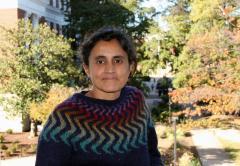Innovative African Kinship Study Continues, Adapts Amidst Pandemic
Lessons Learned about Safety, Equity Will Inform Future Projects
Professor Sangeetha Madhavan, Chair of the Department of African American Studies, and a multidisciplinary team of UMD researchers had just launched a first-of-its-kind study to examine marriage, kinship, child support and related implications on children’s health and well-being in Kenya when the global COVID-19 pandemic struck in 2020.
Madhavan and her colleagues are interested in exploring the accuracy and limits of the old adage, “it takes a village to raise a child.” The team is examining how the proverbial “village” functions in rapidly urbanizing yet impoverished communities in Nairobi, Kenya. Considering “marriage as a process,” they are studying the contours of kinship and child-rearing support, exploring how families balance work, education and the needs of children, while facing the challenges of poverty.
When the pandemic hit, the researchers had to pivot on the protocol to manage the research activities with safety as the top priority for both field-based researchers based in Kenya and the participants.

“Amazingly, we have accomplished all of what we had proposed for Year 1, despite the fact that COVID continues to be a serious problem in Kenya, with massive vaccine shortages. This is, in large part, due to the amazing collaboration with our Kenyan colleagues and tireless efforts by the UMD-based researchers,” Madhavan said. “We held bi-weekly team meetings via Zoom, and conducted multi-day workshops over Zoom to train the interviewers on the new tools.”
The team has overcome time differences, connectivity issues, and tech problems. The success to date is due, in large part, to the interviewers, Madhavan said.
“The interviewers are highly skilled and know the context very well,” Madhavan said. “Data were collected using Open Data Kit administered on tablets. We also had a very productive five-day workshop to develop the qualitative instruments.” As a result, they were able to achieve the target 10% sample for pre-testing the survey and are well prepared for Year 2 activities.
The team also published a blog post that describes their successful process and collaborations, in the hopes that the information is helpful to other researchers.
While the team can celebrate its success—and hopes that the process becomes easier in the future—Madhavan says that the pandemic has brought many hardships and inequities to light.
“It is important to acknowledge the massive global inequities in vaccine access. For our project, it means being sensitive to the needs of our Kenyan colleagues and participants who do not have the luxury of accessing vaccines with the ease that we do in the United States,” Madhavan said. “Moreover, there is noticeable—and understandable—resentment toward those in the United States who are choosing not to be vaccinated, despite the availability and access to the vaccine that we have in this country.”
Looking forward, this project and similar research endeavors must adapt to the “new normal” of remote work and remote interaction, even when travel and in-person meetings become more safe and typical, Madhavan explained.
“There is no doubt that virtual platforms such as Zoom will be critical to the success of field-based projects, regardless of the COVID trajectory. COVID has also underscored the immense responsibility that researchers from the Global North have to maintain and possibly strengthen human subjects’ protection, not only for respondents, but for interviewers who may be putting themselves at risk to get the project done,” Madhavan said. “Those of us in the Global North need to recognize the enormous suffering this pandemic and future ones have and will have on the lives of people we are interested in. In the future, budgets may need to include resources for PPE equipment and mental health referrals.”
Madhavan and her colleagues will keep the perspective they have gained in mind as they go forth with the project. The next steps will be to finalize the survey instruments based on the results of the pre-test; to finalize the qualitative tools; to conduct training in Nairobi in January—hopefully in person; and to administer Wave 1 of the survey in the early spring, either in person or via telephone.
Despite a shifting research landscape, the goal of the project remains the same.
“We want to better understand families and communities. The people who live outside your physical home are often just as important as the people who live with you, especially when migration is involved,” Madhavan said. “The findings from this project have the potential to really get us to think about big theoretical questions such as, what is the meaning of family in the context of urbanization and migration? To what extent is biological kinship important in the care of children? How has technology altered the meaning of ‘social connection?’ In this sense, the relevance of this study goes well beyond Kenya and Africa to even the United States.”
Image of family in Nairobi, Kenya by Shutterstock.
Published on Thu, Aug 26, 2021 - 2:36PM



